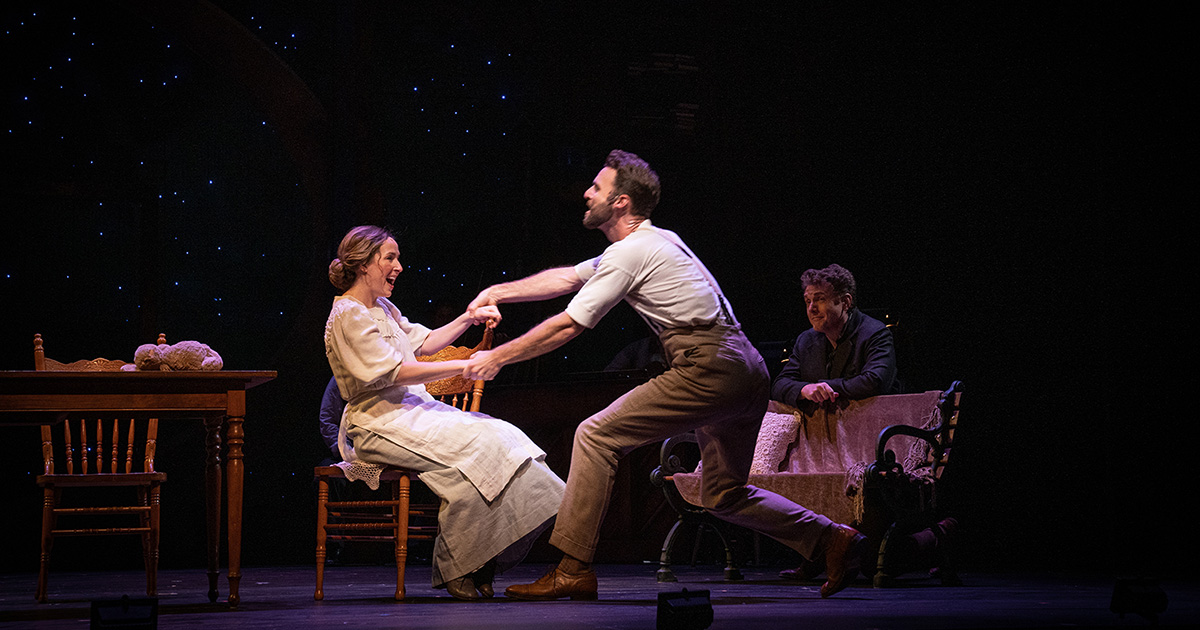Knoxville has often had a tenuous relationship with its own atmospheric history, a history full of intersections between geography and notable persons that weave in and out of our cultural consciousness. A perfect example of this is that of James Agee whose autobiographical Pulitzer Prize-winning novel, the posthumously published A Death in the Family, describes his childhood in Knoxville’s Fort Sanders neighborhood and a seminal event in his young life—the death of his father in a automobile accident. In addition to a 2007 restoration, the novel has enjoyed a number of adaptations including a play, All the Way Home by Tad Mosel that itself won a 1961 Pulitzer Prize, and a 1963 film shot in the Knoxville area that starred Robert Preston and Jean Simmons.
The latest adaptation of the Agee work carries a bit of ironic familiarity for Knoxvillians—a musical version entitled Knoxville, written by the late Frank Galati with music by Stephen Flaherty and lyrics by Lynn Ahrens that premiered in 2022 at the Asolo Repertory Theatre in Sarasota, Florida. The musical’s most recent production opened this past weekend at the University of Tennessee’s Clarence Brown Theatre sporting a superbly polished staging and a uniformly strong cast. This Knoxville is as hauntingly poignant as it is eloquent in its language. The production features two actors from the Asolo original, Jason Danieley and Hannah Elless, as well as director and choreographer Josh Rhodes, who was the original production’s choreographer.

Those familiar with either the atmospheric Agee novel or the Mosel play will recognize the fine line that must be trod in creating a stage musical from a literary work. Of course, Flaherty and Ahrens have that experience having been the creators of Broadway’s Ragtime, a work similarly set in the early 20th Century that was directed by Galati. Just as in that earlier work, the team has organically integrated music numbers into the storyline, allowing the sense of nostalgia and atmosphere to underpin the work as a whole. The work’s gently eclectic musical styles, as handled by Music Director Ming Aldrich-Gan, toy with jazz, ragtime, fiddle music, and 20th Century period ballads, getting their charming interest from instrumental colors from an onstage ensemble of keyboard, strings, guitar, and clarinet.

Galati’s story begins with writer Agee (the excellent Jason Danieley) in his New York city apartment in 1955. The writer is at work on the novel but struggling with how to portray the memory of the tragic loss of his father to an automobile accident and the effect it had on his mother and family. As Agee (“The Author”) conjures up the past, the narrative moves to Knoxville in the summer of 1915, allowing Agee to mix and mingle with fragments of the past as a spectator. His six-year old self, Rufus Follet (a truly accomplished Nick Barrington) is there with his flawed, but warm and loving father, Jay Follet (Alan Chandler), and his mother, Mary (Hannah Elless). An excellent ensemble of actors carry the often humorous and competing family dynamics that are inevitably universal: On Jay’s side, there is his alcoholic undertaker brother, Ralph (Chris Hoch), Ralph’s wife Sally (Lili Thomas), and Jay’s mother Jessie (Laura Beth Wells)—on Mary’s side is her aunt Hannah (Shinnerrie Jackson), her brother, Andrew Lynch (Clay Cooper), and her mother Catherine (Katy Wolfe) and father (Brian O’Neill). This cast also includes a terrific McKinley Merritt as Victoria, Mary’s friend, and richly voiced Dwelvan David as the Ferryman of Jay Follet’s fateful trip.
As befitting such a narrative of curated memories, Robert Perdziola’s set has a similar quality of abstraction and suggestion that is painterly—with help from Kenton Yeager’s revealing lighting—without being simplistic. Doorways are merely door frames, simple furniture defines rooms and spaces, the texture of swagging fabrics takes on meaning, and the sense of scale—just as a child would perceive it—grows and shrinks in relation to the strength of the memory. A shopping trip downtown with Shinnerrie Jackson’s marvelous Aunt Hannah becomes an adventure for young Rufus as display cases tower and loom, and the pair sing “Life is in a Store.”

Photo: Ella Marston, Clarence Brown Theatre
Appropriate, too, is the handling of the fateful event of the accident, told with suggestion of car, location, and cause. The beautiful “A Cotter Pin” reflects how the acceptance of random incongruity allows us to give into the sudden and life-altering. Similarly, “Black Dress” uses the symbolic funeral garb to represent those things we accept as inevitable.
Savoring an opening number titled appropriately “Knoxville,” Knoxvillians will have different emotions and view Knoxville with different eyes and ears than others will. As reflected in the Finale, however, the inevitable take-away of this evocative production must be that each of us are a product of our histories. But, however strong our nostalgia for a time gone by, however powerful our memories of joys and regrets, we simply can’t go home again. The best we can do is use the past as a lesson and pass through each abstract doorway of life with as much grace as possible.







